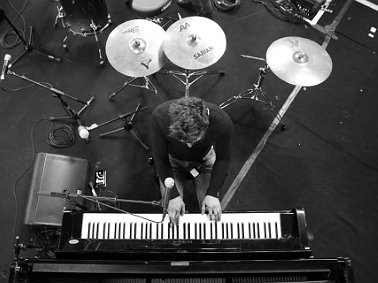Part 2
What do improvisation and composition mean to you and what, to you, are their respective merits?
Some compositions come 100% from improvisation. You’re playing around, and then all of a sudden you’re playing something. Other compositions are developed and progressed through improvisation. I love them both. I could not live without either.
Answering this question has made me realise that I improvise to compose, but that I don’t often improvise around a composition once it’s finished…and that’s something I’d like to do more of.
Do you feel it important that an audience is able to deduct the processes and ideas behind a work purely on the basis of the music? If so, how do you make them transparent?
No I don’t think it’s important. For the most part, I would like the processes to be invisible so that the audience can just experience the music - rather than fixating on the creation of it. Then the listener can develop their own ideas around the music, or just enjoy it as sound.
I think of it like reading a book of fiction - you as a reader are doing a lot of the work giving meaning to the words on the page. Those words have been written as such to aid you in the creation of meaning. It’s up to you whether you take that at face value or link it to other things in your own personal experience of the world.
With more and more musicians creating than ever and more and more of these creations being released, what does this mean for you as an artist in terms of originality? What are some of the areas where you currently see the greatest potential for originality and who are some of the artists and communities that you find inspiring in this regard?
Being original does not have to mean being unique. Originality has to do with the source of an idea - coming from you and no-one else. Someone else may have the same idea. It can be theirs too. There’s something about the myth of the ‘genie’ - or as creativity as something in the ether and not about the individual.
I can see inspirations in my work that reflect things I’ve heard for sure. From recording techniques to compositional quirks. Even just being inspired by someone else’s audacity or purity of vision.
Lately I’ve been really inspired by the contemporary jazz scene, GoGo Penguin, The Bad Plus, Neil Cowley Trio. You can hear the influence of other genres being filtered through their virtuosity. Especially electronic music. Also the West Coast jazz players who are creating new forms of soul and hip-hop. Really amazing stuff.
How would you define the term “interpretation”? How important is it for you to closely work together with the artists performing your work?
It’s very important. I have to be there to hear it. I love hearing how players interpret the notes on a page. The dialogue that happens with a quartet in the studio before the first take challenges you as a composer to not only know how to communicate the finer details, but also to dig into those details and discover your subconscious convictions that went into the creation of a piece.
The effect of a piece doesn't merely depend on the performance of the musicians, but also on the place it is performed at. How do you see the relationship between location and sound? In how far do you feel the current system of concert halls is still the right one for your music – or for contemporary music in general?
The relationship between location and sound is a tug of war. Sometimes the sound wins, sometimes the location wins. Hopefully the location is interesting enough that it winning, is enjoyable in itself. For example, playing in a cathedral…so much sound is lost, but no-one minds because it’s beautiful. Concert halls are right because it’s what they were built for - they sound great and the atmosphere is just so. But disruption is also good. You need to try things out in different spaces. You need to take music out of its comfort zone not only to see what else you can achieve, but also who else you can reach.
What's your view on the role and function of music as well as the (e.g. political/social/creative) tasks of composers today - and how do you try to meet these goals in your work?
Primarily inspiration and enjoyment. In my experience, music can teach you things about yourself that you didn’t know already. It can also disarm you, and put you in mental states where new thoughts and ideas can develop. Music (and art) has the ability to inspire action even if the message in the artwork is not inherently political, because any kind of action is creative - having a vision and trying to make it exist in reality.
Do you have a musical vision that you haven't been able to realise for technical or financial reasons – or an idea of what music itself could be beyond its current form?
Yes. There’s a piece I’ve been working on for a couple of years. I have yet to find how to make the sound that is in my head. I’ve got a guitar demo of it which is what inspired the idea. It’s quite ambient, but kinetic at the same time. As soon as I’m done on a couple of other pieces, I’m going to get to the piano and try to figure out how to do it, but I have a feeling it will require an ensemble and maybe some electronics that I haven’t discovered yet. And a lot of revisions.
Find Richard online at http://rjbirkin.co.uk/






